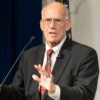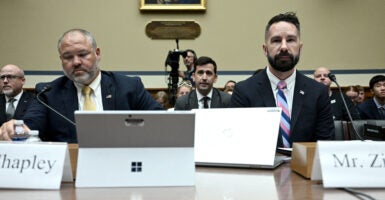A key House committee heard testimony Wednesday from two IRS whistleblowers who detailed what they said was Justice Department officials’ efforts to slow or impede an investigation of presidential son Hunter Biden for unpaid taxes.
Committee Republicans sought to extract as many details as they could from the two veteran IRS employees, while Democrats seemed to try to disparage them and to change the subject to Donald Trump from President Joe Biden’s son.
The hearing was especially dramatic because it featured testimony from IRS agent Joseph Ziegler, who publicly identified himself for the first time, as well as his supervisor on the case, Gary Shapley, who went public weeks ago.
In his opening remarks, Ziegler said his testimony was credible not because he is a Democrat and a gay married man but because of his IRS job experience.
Ziegler later called for a special counsel to look into why the Justice Department opted against charging the younger Biden with felonies and instead reached a plea deal with him.
Under that agreement, the president’s son would plead guilty to two misdemeanor counts of failure to file income taxes and thus avoid prison. DOJ officials reached the deal despite evidence that Hunter Biden made millions of dollars in overseas business deals in China, Ukraine, and other places by using his father’s name.
Here are four highlights from the hearing by the House Oversight and Accountability Committee.
1. ‘Investigative Steps That Involved President Biden’
Rep. Gary Palmer, R-Ala., brought up an FBI form in which a confidential informant says an executive of the Ukrainian energy company Burisma paid a $5 million bribe to Joe Biden while he was vice president and made a separate $5 million payment to Hunter Biden.
“I reviewed the form, and there are startling allegations in it. What would you have done if presented with this piece of evidence regarding this potential stream of income?” Palmer asked Shapley about the FBI form, called an FD-1023.
Shapley replied that he knows only what has been reported about that.
“I can say there were investigative steps that involved President Biden that were not allowed to be taken,” Shapley told the committee. “Information like this would have been really helpful to have for investigators when we received any pushback, when we were asked to take names on a document or search warrants. It would have been nice to have information that helped to prove [the case].”
>>> Related: Citing Unpursued Evidence, IRS Whistleblower Calls for Special Counsel to Probe Biden Case
Palmer asked whether IRS investigators weren’t allowed to see other evidence. In answering, Shapley referred to Assistant U.S. Attorney for Delaware Lesley Wolf, who works for the official who is supposed to be in charge of the investigation: U.S. Attorney for Delaware David Weiss.
“One piece was the Hunter Biden laptop,” Shapley told Palmer, then referred to previous sworn testimony in which he mentioned his own memo that “documented contemporaneously” what Wolf told IRS and Justice Department investigators Sept. 3, 2020.
Wolf said that “they had information from the laptop that they were not providing to the investigators,” Shapley told Palmer.
Twitter, Facebook, and other social media companies suppressed the New York Post’s reporting on the contents of Hunter Biden’s abandoned laptop, and former U.S. intelligence officials warned it was Russian disinformation, in October 2020—weeks before the presidential election pitting Biden against Trump.
2. $17 Million From Foreign Interests
House Oversight and Accountability Chairman James Comer, R-Ky., asked Ziegler about the amount of money that Hunter Biden and his business associates collected from foreign companies over the years.
“How much money did Hunter Biden and his associates receive from the Romanian company you identified?” Comer asked.
Ziegler responded: “The approximate total transfer from the Romanian company would have been $3.1 million to everyone.”
Comer then asked: “How much did Hunter Biden and his business associates receive from State Energy HK Ltd. through the Robinson Walker LLC?”
Ziegler replied: “$3 million.”
Comer continued asking about individual companies until getting to Burisma, the Ukrainian energy company.
“Burisma paid to everyone involved $6.5 million,” Ziegler said, referring to Hunter Biden and his business partners.
Comer added: “Burisma also paid Blue Star Strategies and a law firm hundreds of thousands of dollars, bringing the total Burisma payments to over $7 million.”
Ziegler replied: “That is correct; $7.3 million.”
Comer: “Between 2014 and 2019, this brings the total amount of foreign income stream [to Biden and business partners] to approximately $17 million, correct?”
Ziegler: “That is correct.”
Comer later asked why the IRS investigators wanted to interview the president’s grandchildren.
“As a part of the investigation, you want to interview people who might have received money, people who might have had deductions … on their tax returns,” Ziegler replied. “There is a multitude of reasons why you would want to talk to family members.”
Comer: “Is it common for grandchildren to receive money from foreign nationals?”
Ziegler: “I don’t know the reason or what’s behind any of these payments that might have been made to specific family members, but I can just speak to what was in our transcript.”
The IRS agent was referring to the released transcripts of his and Shapley’s testimony to committee investigators.
3. ‘Who Are You Going to Believe?’
Rep. Jim Jordan, R-Ohio, a member of the Oversight Committee who also chairs the House Judiciary Committee, noted multiple contradictions from the Justice Department.
Jordan kept asking, “Who are you going to believe?” in comparing the Justice Department with the IRS whistleblowers who said the Justice Department slow-walked and impeded the investigation of Hunter Biden.
The Ohio Republican drew Attorney General Merrick Garland, the Biden appointee who runs the Justice Department, into the picture.
“April 26, in front of the United States Senate, the attorney general said [U.S. Attorney] David Weiss is in charge of the investigation,” Jordan said. “Oct. 7, in a meeting with Gary Shapley, one of the [IRS] whistleblowers, David Weiss said, ‘I’m not the deciding official,’” Jordan said. “Who are you going to believe?”
“On Feb. 28, I wrote to the attorney general [Garland] asking him why there is no special counsel in the Hunter Biden investigation,” Jordan said. “He didn’t respond, which is unusual in and of itself. They always respond when a Judiciary Committee member writes something to them. I wrote again on May 25. He didn’t respond, but David Weiss did.”
Jordan continued:
Here’s what [Weiss] said on June 7: ‘I have been granted ultimate authority over the matter, including deciding responsibility for where, when, and whether to file charges.’
That’s what the U.S. attorney said on June 7. Three weeks later, Mr. Weiss wrote to me again and says, ‘I stand by what I wrote, but I wish to expand.’ Already changing his story 23 days later. He says this: ‘My charging authority is geographically limited to my home district.’
Wait a minute. You just told me 23 days before you have ultimate authority. Then again on July 10, Mr. Weiss wrote Sen. [Lindsey] Graham and said this: ‘To clarify, I have not requested special counsel designation. Rather, I had discussions with departmental officials.’
Mr. Weiss can’t get his story straight.
Jordan went on to focus on contradictory accounts given by the Justice Department and the IRS whistleblowers.
“Who are you going to believe?” he asked. “The Justice Department that can’t get their story straight, change three times in 33 days, or these two guys, the go-to guys in international tax evasion cases, the A-team when it comes to these kind of investigations, all over the world they’ve done this, and have been consistent throughout?”
4. ‘Afraid to Ask Questions’
During the 2020 presidential campaign, Ziegler said, the Justice Department used that as grounds not to follow certain leads because of a policy against election interference. But, he said, after Biden was elected, the investigation of his son was “hamstrung.”
“When it came to questions as a part of the investigation, we interviewed a lot of people,” Ziegler said. “As a part of that investigation, you want to feel free to ask questions. It should be an open environment. [But] there was an environment when we were interviewing witnesses when you were afraid to ask questions that could lead to the presidential campaign. And this is after the campaign is over, it was restricted.”
Rep. Raja Krishnamoorthi, D-Ill., later seemed to think he had the two IRS whistleblowers cornered. But ultimately, he didn’t seem to understand the Justice Department’s policy on not interfering with elections.
Krishnamoorthi asked Ziegler: “Joe Biden was not the president in the presidential primaries of 2020?”
Ziegler replied, “Correct.”
Krishnamoorthi then asked Shapley: “You said warrants were ready as soon as April 2020 to begin searching for records, but actions weren’t taken with regard to those warrants. Again, Joe Biden was not the president in April 2020, was he?”
Shapley sought to correct the Illinois Democrat.
“I’m confused by your line of questioning,” the IRS supervisory agent said. “We are talking about an election which now-President Biden was a part of. So, he didn’t have to be president to have election meddling.”
The Democrat congressman shot back: “No, was he the president at that time in April 2020?”
“It’s clear that he was not the president. An election is for the purpose of electing a president,” Shapley replied, adding:
Joe Biden at the time was a nominee for president of the United States. Therefore, the election clause with DOJ policy was in effect. It wasn’t until Sept. 4, 2020, that the Department of Justice Public Integrity [Section] said we could no longer take any action on that case. As early as April to June of 2020, the Department of Justice, Delaware U.S. Attorney’s Office, was already invoking the election as a reason not to perform those search warrants.
Ken McIntyre contributed to this report.
Have an opinion about this article? To sound off, please email [email protected] and we’ll consider publishing your edited remarks in our regular “We Hear You” feature. Remember to include the url or headline of the article plus your name and town and/or state.































